As our member venues are delighted to welcome guests back this month, there is a topic that is never far away from their minds - sustainability and helping towards making a better future for us all. Many of the buildings which host fantastic events big or small have been making some impactful changes. Examples of these changes include sourcing and implementing energy saving solutions, generating their own electricity onsite, using re-purposed materials and avoiding single use plastics, working with suppliers who are committed to ethical, sustainable and environmentally friendly working procedures, prioritising reducing food wastage and off setting their carbon footprint with zero to landfill processes. Here is just a snapshot from the in-depth sustainability policies that venues are working towards.
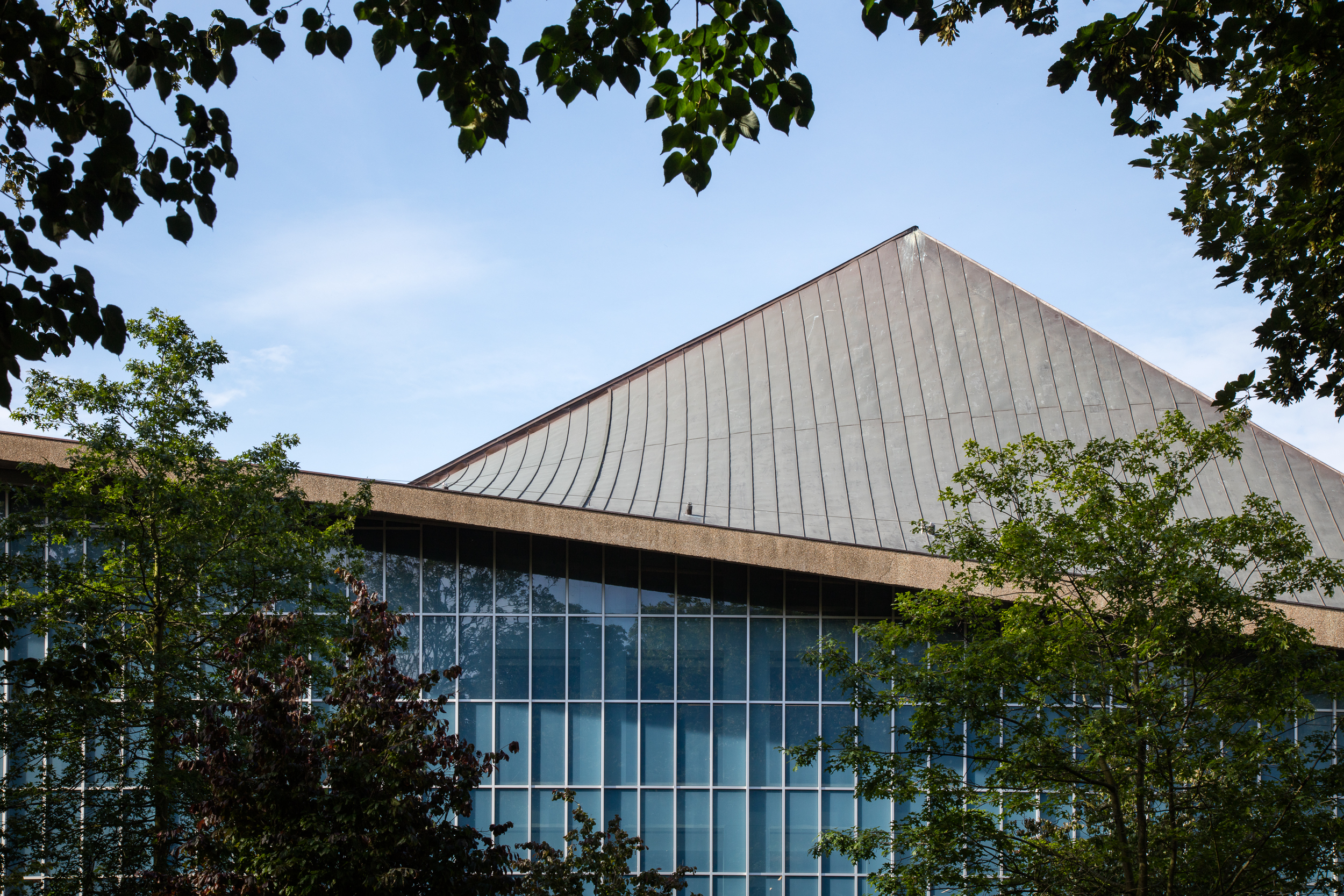
Image credit: Luke Hayes
The Design Museum is dedicated in becoming a more sustainable venue and has made some impactful changes to help create a greener future for the planet. This involves sourcing and implementing energy saving solutions, maintaining green spaces and working closely with our accredited suppliers to reduce their environmental impact.
Sustainability snapshot:
- The museum has re-purposed materials from the Commonwealth Institute, such as the marble floor which has now become the mezzanine’s feature wall, as well as the stained-glass window in the shop.
- Lights off: The PIR sensors in the museum’s spaces mean that lights will only be turned on when the room is in use.
- Battery power: we have installed voltage optimisation equipment which reduces the building’s power consumption by 15%.
- Avoiding landfill: we send most of the museum’s refuse to be recycled, and the remainder goes to an ‘energy from waste’ reclamation site.
- Water: we collect and store rain and surface water, which then gets processed and is used to flush the building’s WCs.
- From locally sourced produce to re-purposed materials, we work closely with our accredited suppliers to help ensure we create thoughtful, sustainable events for our clients!
For further information contact the events team venuehire@designmuseum.org
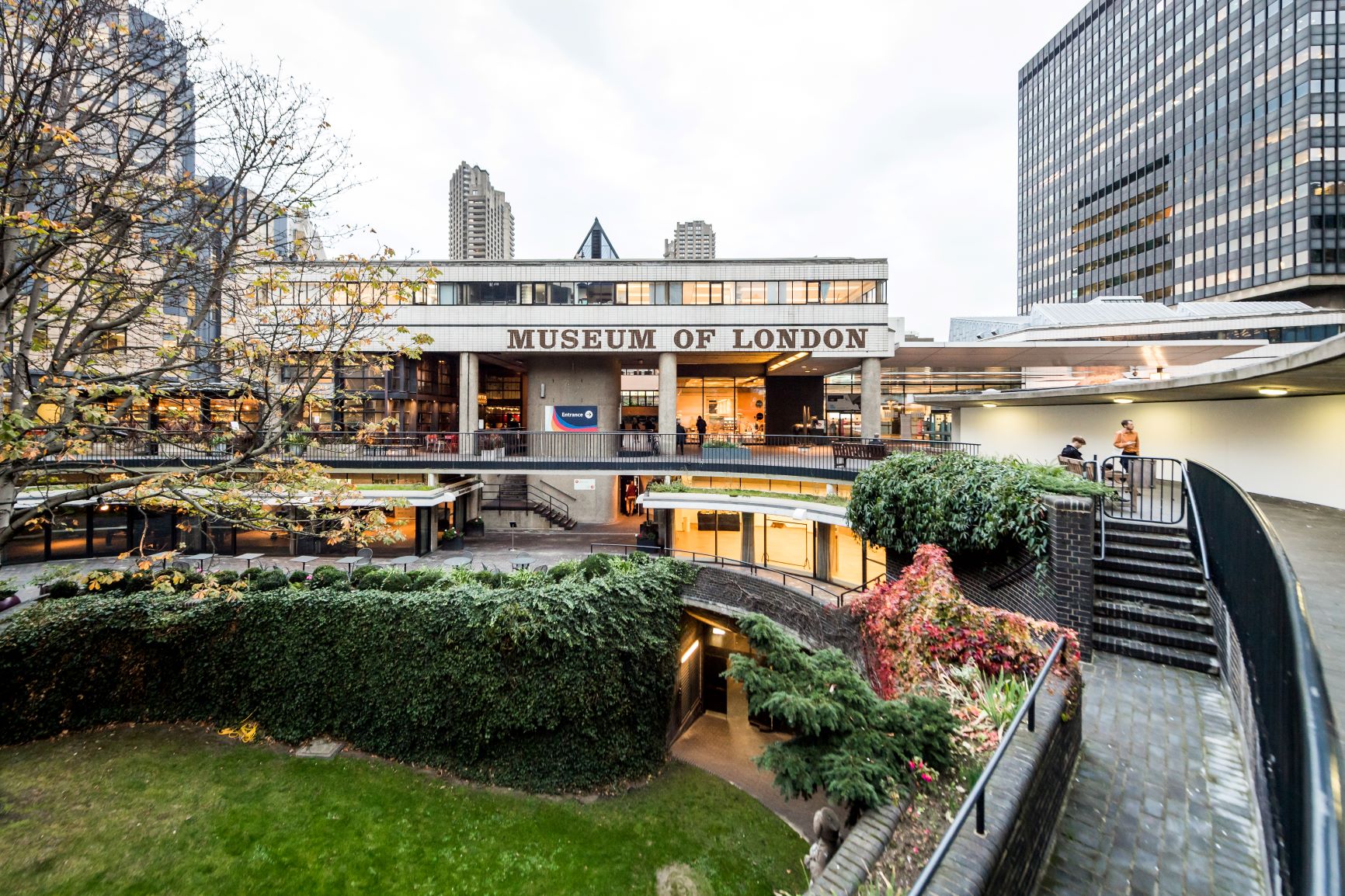
We have several initiatives in place across our events department at the Museum of London to ensure our impact on the environment is reduced to an absolute minimum.
For the first time, the Museum of London now has 0% of waste going to landfill. We have reduced our printed material associated with event enquiries and bookings, increased our recycling rate to 52% and now use only sustainable, reusable promotional material. We also have a rainwater harvesting system in place, which allows us to filter captured water to be used in several spaces across the museum, as well as green roofs on our Terrace Gallery, Boardroom and Garden. These roofs are partially covered with planting, which releases oxygen, filters pollutants and helps insulate the buildings, whilst also creating natural habitats and encouraging biodiversity.
Even the products our cleaning company DOC Cleaning Limited use are environmentally friendly. It all makes a difference, and we look forward to continuing to work with clients to deliver safe, Covid-secure events that protect the environment.
For more information about the Museum of London, its Covid-compliant procedures and event availability, contact our dedicated team on venuehire@museumoflondon.org.uk
RIBA at 66 Portland Place is committed to issues of sustainability and has implemented several significant initiatives across the department. All disposable items are now compostable including food boxes and cups, and single-use plastic has been drastically reduced across all spaces. To reduce paper wastage, all internal communications are electronic, and clients are encouraged to use digital only communications wherever possible with the team.
RIBA works closely with in-house caterer CH&CO to devise healthy, sustainable, and locally sourced menus that fill and fuel delegates, whilst reducing their environmental impact. The caterers’ Waste No Food initiative works to monitor, manage and innovate to reduce food waste and the chefs will rework leftover ingredients into dishes, for example turning left over vegetables and meat into stock or roasting up potato skins to make crisps, in order to avoid waste.
Other initiatives in the kitchen include recycling coffee grinds and cooking oil, redistributing food to a client’s selected charity, mindful portion sizes, and nose-to-tail cookery. The kitchen has reduced meat usage by 20% and increased the proportion of vegetarian dishes on menus to combat environmental damage, whilst also serving up a ‘Chefs Choice’ day delegate lunch menu which is based on what’s in season.
For further details please contact: venues@riba.org
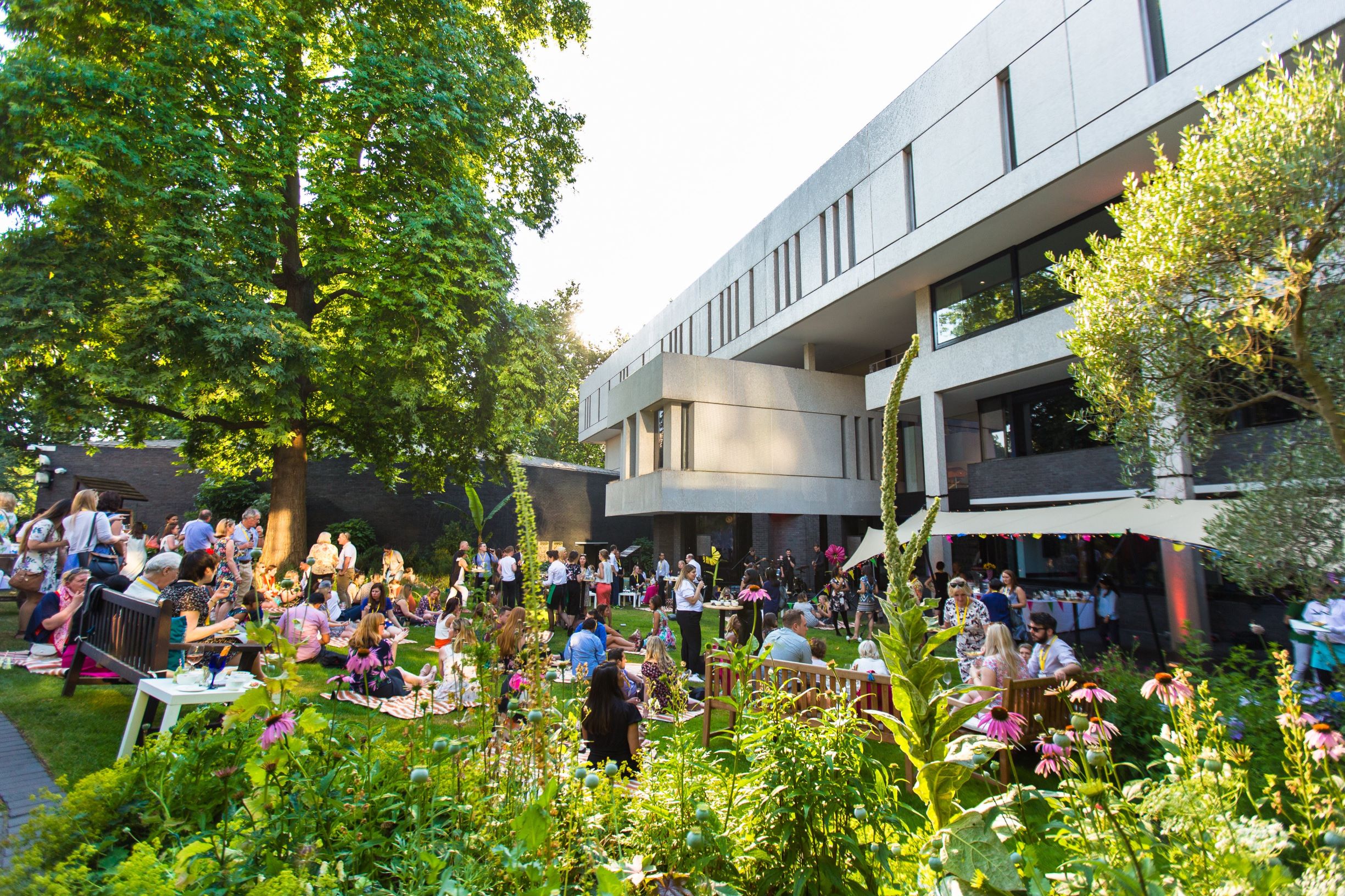
A sustainable summer at RCP London Events
Sustainability is a key part of everyday operations across all areas of the RCP London Events business including catering, waste management and energy. Our strategic objectives have been to look at all areas of our business to ensure all of our suppliers and service partners are environmentally conscious and committed to helping to improve our waste streams and lowering our carbon footprint substantially in the next three years.
We are the first and only royal college to achieve The Carbon Trust Standard which is the world’s leading independent certification of an organisation’s achievements in reducing environmental impact. We also hold ISO 14001 standard certification for environmental best practice.
We recently formed an exciting partnership with bio-bean, the world’s largest recycler of spent coffee grounds, to transform our 3,500 kg of waste coffee grounds a year into sustainable bio-products. Our coffee grounds, which formerly went into the RCP’s food waste and were processed by anaerobic digestion (AD) into compost, will now be diverted and recycled into eco-friendly fire logs, saving 70 % of the CO2e emissions versus the grounds being sent to AD.
For further information please contact us: events@rcp.ac.uk or call: 020 7034 4900
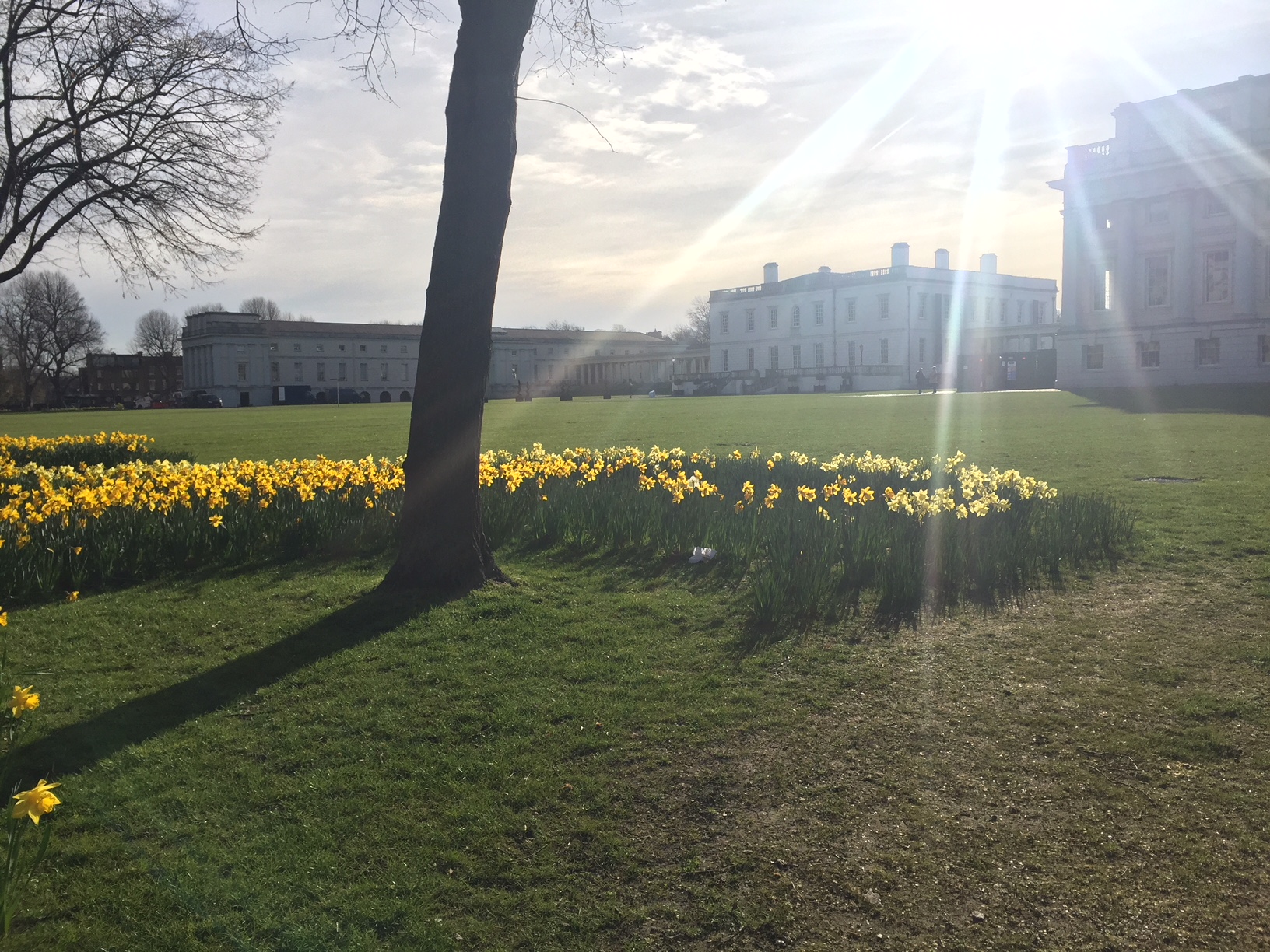
Royal Museums Greenwich recognise that environmental protection is one of the most important issues facing the world today and are committed to working in environmentally sustainable ways, applying the principle of sustainable development for the benefit of current and future generations, both locally and globally.
Not only do they focus on this within their wider museum collections but events at Royal Museum’s Greenwich’s five unique sites work within their Sustainable Policy. This includes ensuring that all their approved suppliers are committed to ethical, sustainable and environmentally friendly working procedures as well as ensuring that wastage of energy and raw materials is minimised through all procedures and the usage of renewable and recyclable energy and products are promoted at all times.
For more information on what Royal Museums Greenwich do every day to be as sustainable as possible, take a look at their full sustainable policy at Venue sustainability policy | Royal Museums Greenwich (rmg.co.uk) or talk to them at events@rmg.co.uk or on 0208 312 8517
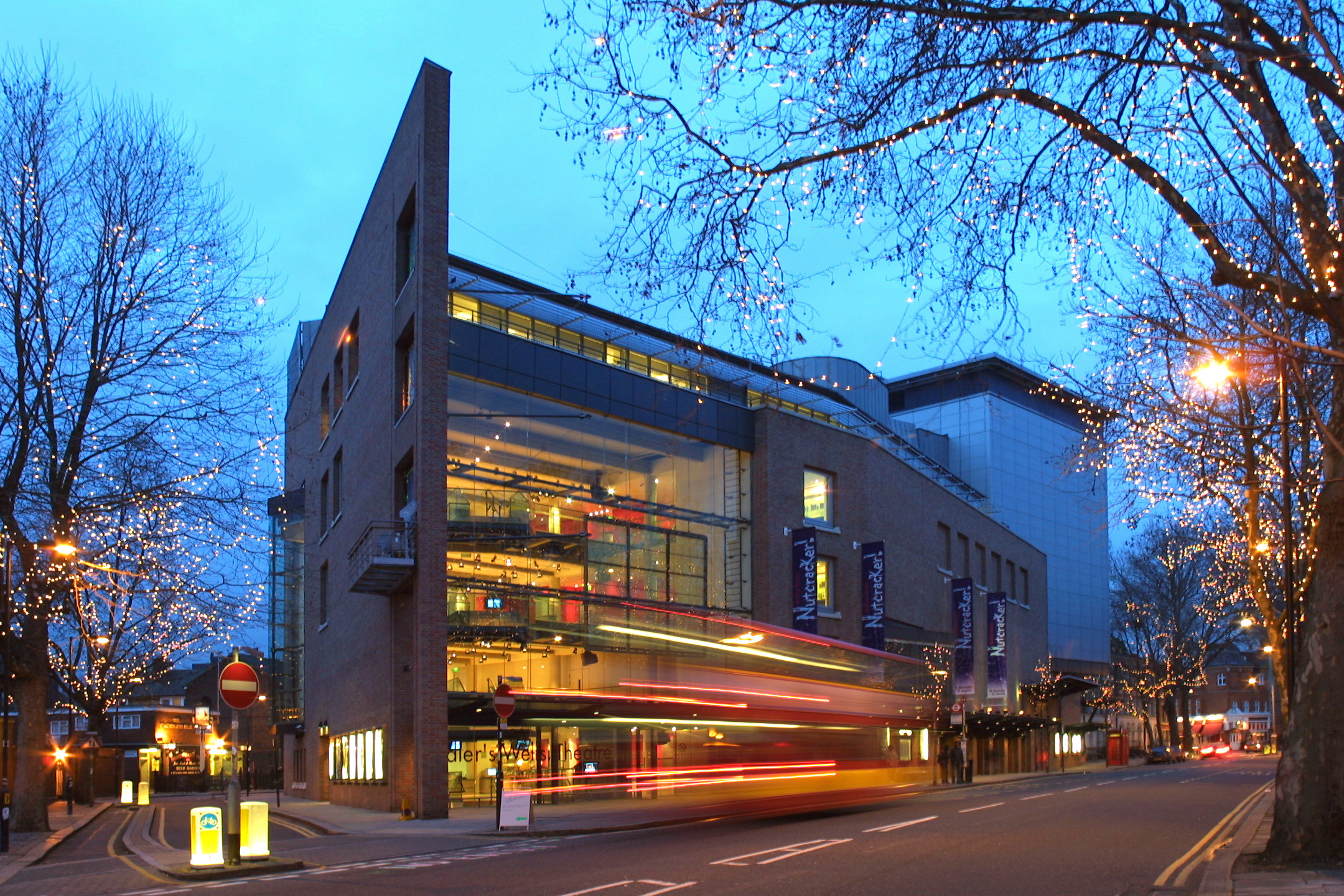
At Sadler’s Wells we are committed to reducing impact that our activities and events can have on the environment. We are proud of our five-star rating in the Creative Green certification by environmental charity Julie's Bicycle.
We use the borehole underneath Sadler's Wells to provide us with the water used for our bathrooms, heating and cooling. LED lights are used throughout our foyer spaces, auditorium, and backstage areas to generate less heat and use less energy. 100% of our electricity is generated by renewable sources.
We also support food and drink suppliers who share our values. One of the best examples is an award-winning Toast craft beer, which received Queen's Award for Enterprise for Sustainable development in 2021 and is brewed with surplus fresh bread.
All our food packaging is biodegradable and plant based, and we are using plastic reusable cups on our bars instead of single use plastic glasses to reduce non-recyclable plastic waste.
Environment and sustainability are at the heart of our event experiences. To learn more please contact: Events@sadlerswells.com
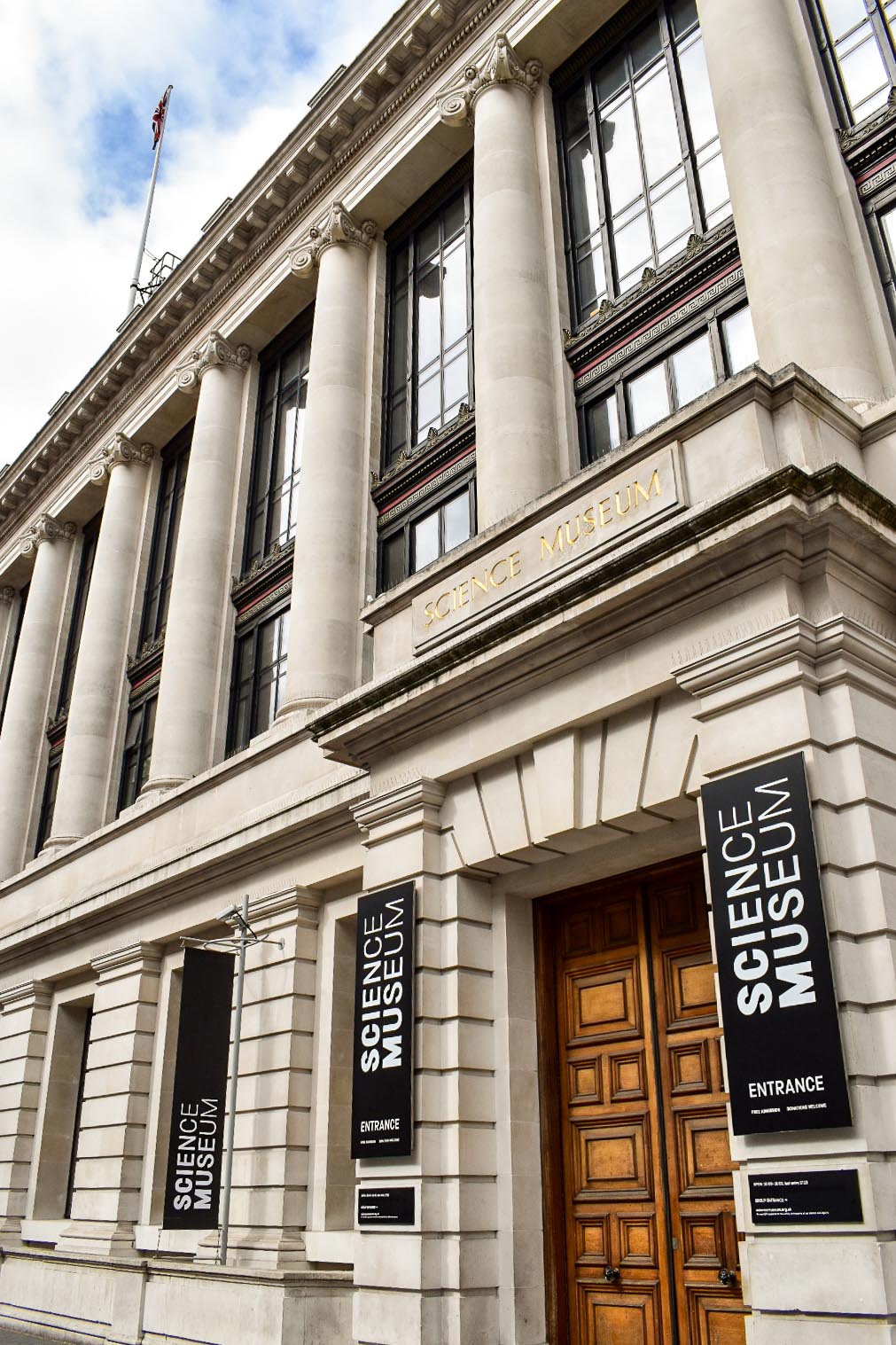
Sustainability at the Science Museum Group
Sustainability is at the heart of our work. As a group, we have announced our target to achieve Net Zero by 2033 and at the Science Museum, our public programme will have a major focus on sustainability and climate change throughout 2021 to coincide with COP26. We re-opened to the public on 19 May with an exciting new exhibition Our Future Planet, the UK’s first significant exhibition which explores carbon capture and storage.
You can find out more about the Science Museum Group's commitment to sustainability here: www.sciencemuseumgroup.org.uk/our-work/sustainability-approach
To contact the events team please email venuehire@sciencemuseum.ac.uk
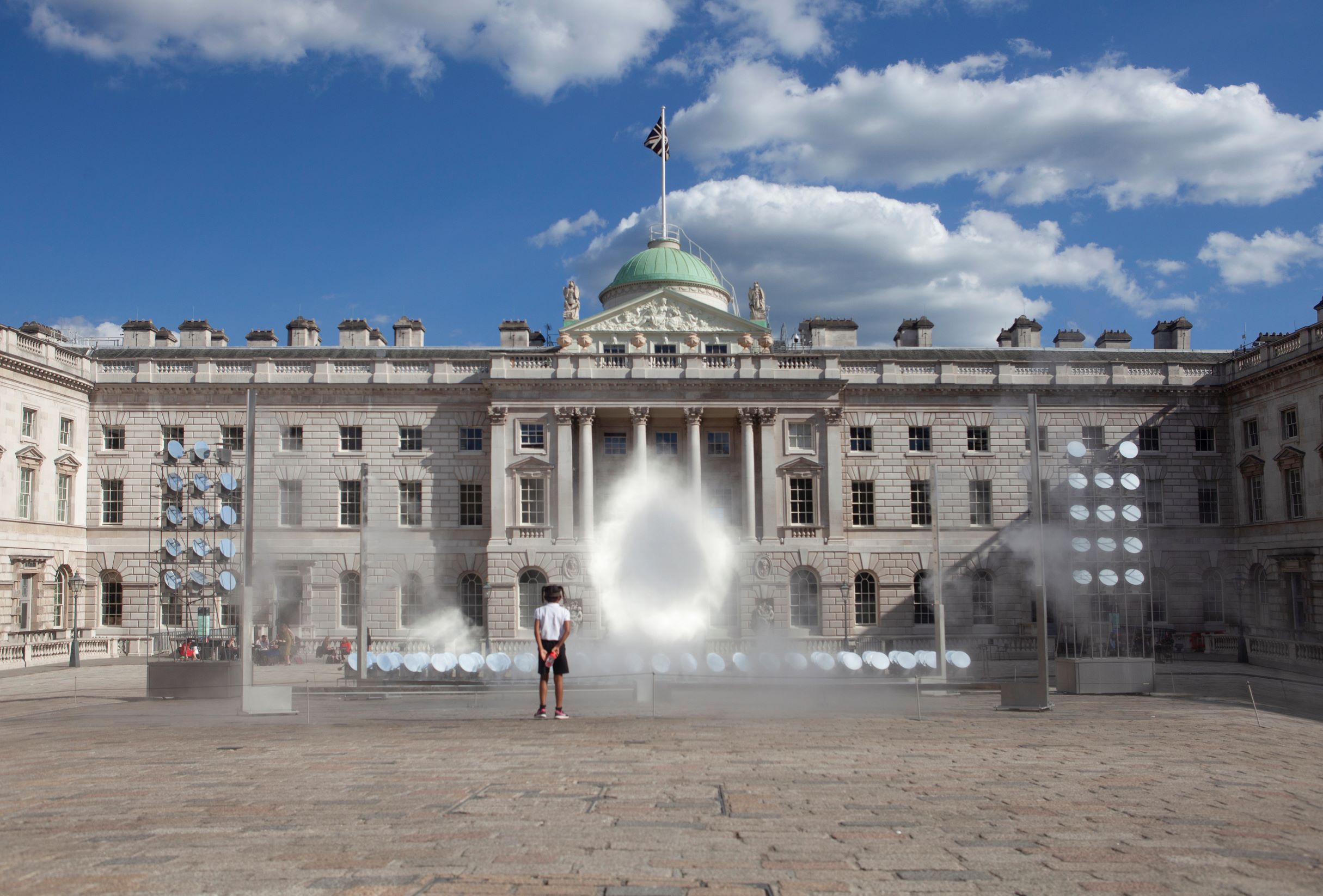
Run as a charity by Somerset House Trust, all event hire income directly contributes to the venue’s cultural public programme, extensive education and outreach work and helps maintain the Grade I listed site for over three million visitors to enjoy annually.
Somerset House aims to be as environmentally friendly as possible and our accredited suppliers are an extension of that. In 2019 Somerset House was awarded a 4-star rating in the Creative Green Awards; we were one of the first cultural organisations to sign “Culture Declares Emergency”; we had 79,000 visitors to our 2019 Earth Day season and our Edible Utopia programme has seen mushrooms grown in coal holes, rhubarb grown in walkways and beehives on the roof.
Somerset House also installed a CHP system and now generate over 50% of our electricity onsite, have installed five public drinking fountains to help cut down on plastic waste and have reduced deliveries to site by 12%, minimising pollution in the local area.
To learn more, contact the events team events@somersethouse.org.uk
At Spencer House we have adapted our garden management plan over the last few years to be more sensitive to the environment as well as the wildlife that can be found here in Central London.
We no longer use any chemicals in the grounds and took the decision to remove the traditional box hedging in response to the increasing damage from the invasive Box Tree moth, rather than attempt to control this with pesticides. Doing so has increased the amount of space available for planting and we did so with a focus on pollinator-friendly species.
Building on this trend, we have just introduced a number of planted circles into the lawn, created from wildflower turf chosen specifically to support invertebrates and increase biodiversity in the garden. The design is inspired by traditional Regency period flower beds with modern sustainability goals in mind. In this way, the garden continues to complement the town palace it was intended to adorn in a contemporary manner.
For further information contact: events@spencerhouse.co.uk
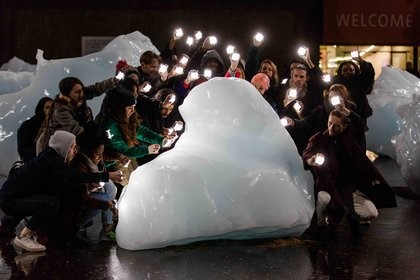
Image credit: Olafur Eliasson and Minik Rosing Ice Watch Bankside, outside Tate Modern, 2018 © 2019 Olafur Eliasson and Minik Rosing
At Tate preserving our collection for future generations means that sustainability is at the very heart of all we do. We work to bring you exceptional experiences whilst keeping the planet in mind.
Our chefs create seasonal menus using local and sustainable suppliers, and at times use fully foraged, ’ugly’ vegetables to help reduce waste.
Tate Eats also ensures minimal food waste by using the Karma food app, meaning left-over food goes to good causes.
Our waste management process has been streamlined ensuring recycling is maximised, with single use coffee cups recycled via Bywaters and investments made in crockery rather than single use alternatives.
At Tate we are also working to reduce our electricity consumption by switching to solar power as well as collecting rainwater to flush our toilets. Get in touch today to hear more about Tate’s sustainability mission; corporatehospitality@tate.org.uk
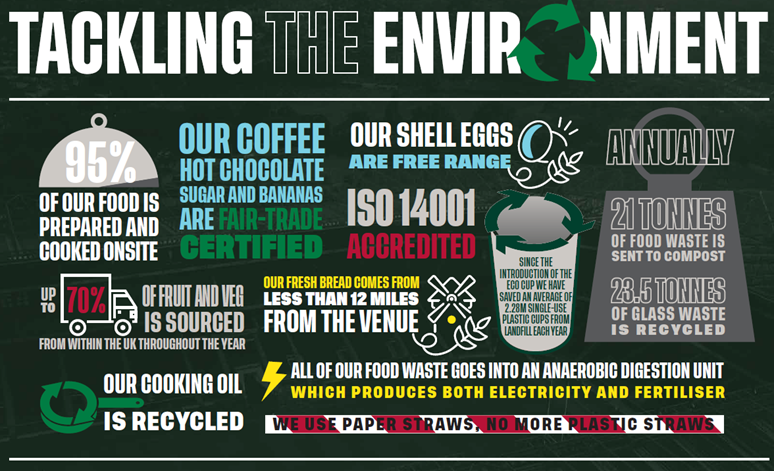
At Twickenham Stadium, we appreciate that we have an inherent responsibility to put in place tangible plans that drive the industry forward and ensure we operate every day in the most responsible and sustainable manner.
We believe in a long term, sustainable approach to business that delivers benefits for all of our stakeholders and we have a well-established commitment to support the wellbeing of our clients, customers, colleagues, suppliers, local communities and the environment.
Some of the ways in which we are achieving this are:
- Twickenham Stadium operates a ‘zero waste to landfill’ policy
- Single use plastics have been reduced by 70% with continued efforts to reduce this further
- Since the introduction of the Eco Cup in 16.08.14 we have saved over 12 million single use plastic cups from landfill and donated £43,380 to charity from returns in the charity bin.
- We source all our meats and fish ethically and from the UK where possible and appropriate to reduce food miles
- Polystyrene was removed from the supply chain together with clear plastic and film-fronted sandwich bags and much of the packaging is now fully recyclable
- Single use chaffing fuel has been replaced by refillable eco burners – zero fuel waste and lower CO2 emissions
- Surplus food is donated to local charities to reduce food waste
As a result of the efforts Twickenham has received the BS20121 Event Sustainability Accreditation for the third consecutive year and the stadium’s new East Stand operational energy performance earned an ‘Excellent’ rating.
For further information and to book an event at Twickenham Stadium, contact: conferences&events@rfu.com
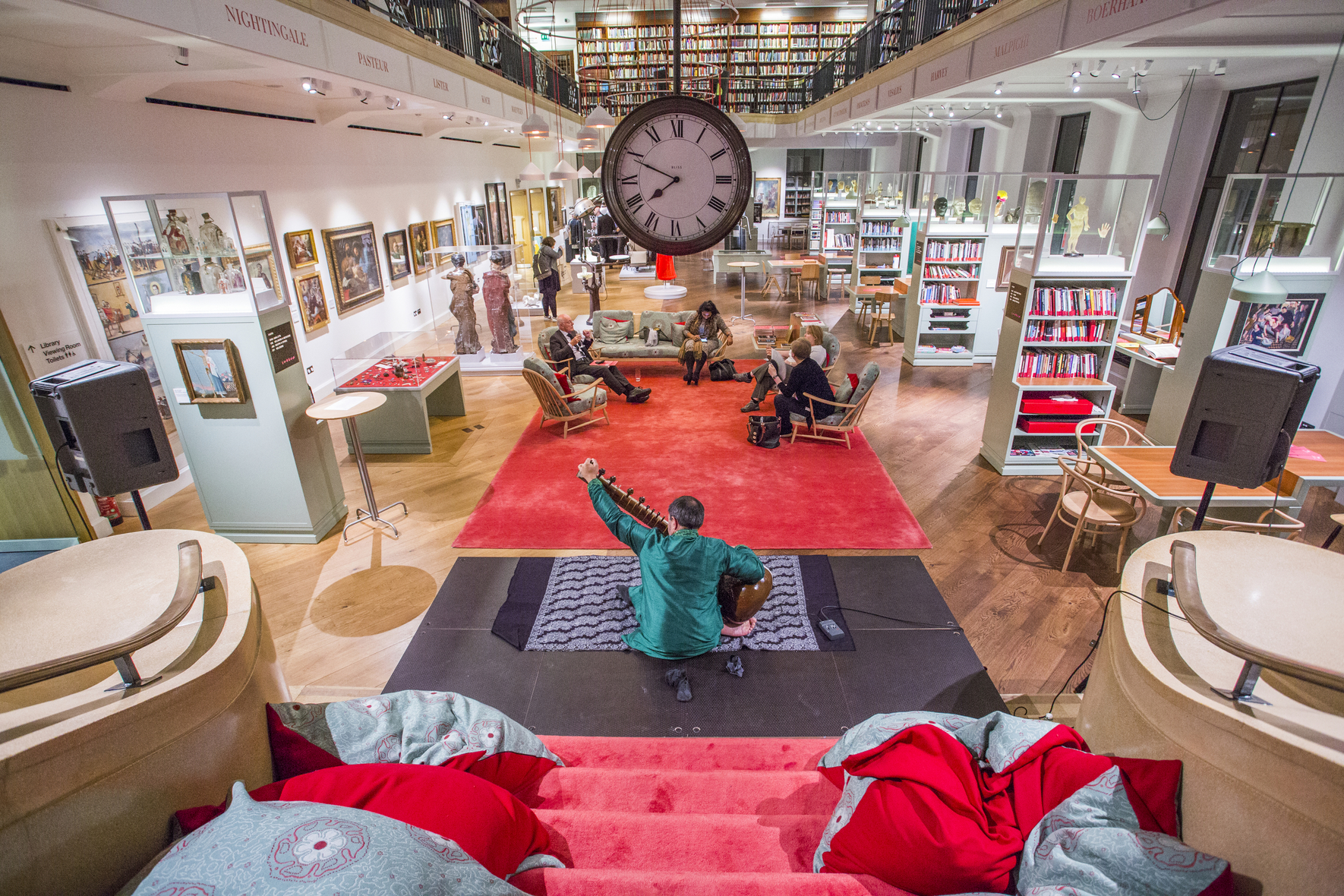
Since its launch in 2007, Wellcome Collection in central London has become one of London’s most exciting event venues due to its constant innovation and dedication to sustainability and CSR.
Prioritising areas such as reducing food wastage through Winnow (our electronic AI system for measuring food waste), by engaging with clients to share information on avoiding the overproduction of food and eliminating interunit packaging for deliveries where possible, has allowed us to reduce food wastage by 1,773kg and shrink our CO2 emissions by 7.7 tonnes between October 2017 and March 2019.
All food waste is collected separately from the kitchens and sent to anaerobic digestion where it is broken down to produce biogas and fertiliser. The biogas is then converted into a clean supply of electricity and heat which enters the National Grid as renewable energy. The fertiliser is given to farmers for free and put back on the land, reducing the reliance on fossil fuel-based fertilisers.
In order to offset its carbon footprint, Wellcome Collection operates a zero-to-landfill process. All non-recyclable waste is sent to be converted into energy. The waste is collected and transported by barge along the river Thames to an energy-from-waste facility. The energy generated from incineration is put back into the National Grid and used to power London’s homes. The ash produced from the incineration process is collected as a source for building materials and used to make bricks or repair road surfaces. The team often take trips to the recycling plant to see first-hand the impact of their sustainability initiatives.
More recently, the venue has acquired digital flipcharts to reduce the use of paper and the meeting room carpets have been replaced with echo-friendly flooring. See our venue here
The venue hire team are proud winners of the ‘Sustainability Award’ at the Conference Awards 2020 and bronze winner of the London Venue Awards for ‘Best CSR/Sustainability Initiative’ category.
For help in organising your next sustainable event get in touch events@venuehire@wellcome.org
